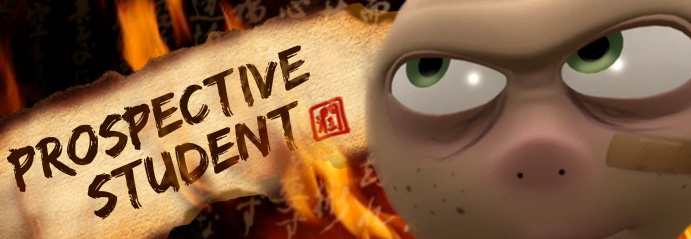Animation Mentor:
How did you come up with the concept for your short film?
Eric Luhta:
I was interested in making a short that had a kung fu setting to it, but wasn’t really a kung fu film. In other words, a fantasy setting balanced out by a rather ordinary but relatable event. I was thinking about that legend where a monk who wants to study at the monastery must prove his dedication by waiting outside for days. There’s a modern twist on it in the movie Fight Club. And then I thought, “What if he was waiting at the wrong door?” This seemed funny, and so it developed from there. I tried to make the story follow a typical joke form (3 attempts to get to the punch line) while following the plot of a student who was so caught up in impressing his teacher that he missed the obvious and made a fool of himself. It’s something I had done many times myself and felt qualified in conveying as a life experience.
Animation Mentor:
What important lessons did you learn from making your short film?
Eric Luhta:
Making a good story is extraordinarily difficult, but also one of the most rewarding things you can do. I learned that the most important thing is to make the story about something the audience can relate to. If they see a character going through something and know what it feels like to be in a similar situation, they’re going to enjoy your film. I also learned an enormous amount about setting up camera shots to convey things properly, as well as planning the animation to not be extraneous but still be entertaining.
Animation Mentor:
How long did it take to complete your film?
Eric Luhta:
I spent 3 months on planning and layout, 3 months animating, and a month doing some clean up, lighting, sound, and music. It was crazy animating that much in that short of a time span, but I dedicated all my time to it and managed to get through it all okay. Having my mentors’ guidance (Ricardo Curtis and Bret Parker) was the key in that as well. After Animation Mentor, my short sat unfinished for about 6 months, and then I took a month and just finished it. In hindsight there are a lot of rough edges, but it was a blast and finishing it has brought me a lot of opportunities.
Animation Mentor:
How much planning was put into your short film? Did planning help make the process easier?
Eric Luhta:
There was a lot of planning for sure. You can’t make a film without planning it thoroughly, period. You don’t have to be skilled in drawing as long as you can communicate the idea in some understandable form. That’s all you really need.
Animation Mentor:
Do you mind sharing some of the pre-production work with us with a little explanation of what we're looking at.
Eric Luhta:
Here is my original story pitch, which ended up being changed once I started the animatic. This version was all about the punch line, and had this darker, gallows type humor ending where the master just let the student die because he was too embarrassed. But after discussing it with my mentor and friends (very important!), I realized it would be better to have the audience sympathize with the student and relate to what he’s going through. So rather than dying, he learns a valuable lesson for our amusement, which I think is more satisfying.
Storyboard Animatic:
Layout Animatic:
Thumbnails for studying physical animations:
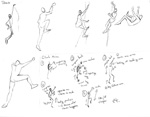
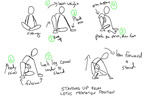
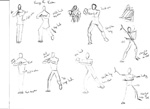
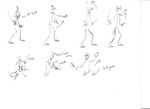
Click images to view in new window
Animation Mentor:
What obstacles, if any, did you experience during the creation of your short film? How did you work your way around them?
Eric Luhta:
Besides animating, the lighting, rendering, and compositing were really difficult because I had never really done them before beyond simple school projects or just playing around. I ended up hiring an artist I was working with at Psyop, Helen Choi, to do the texturing for the characters. It was so worth it, because she gave them a unique twist that I would never have been able to do myself.
The lighting is what it is – it looks like an animator did it (haha), but at least it’s not distracting and still lets you focus on the characters. I learned so much by doing it though and hopefully in my next short I’ll have something that is further developed.
The easiest part was actually the music, since I had been a film composer for a number of years before getting into animation, and it only required a simple score. I knocked it out in a day, dropped it into the film, and hung out with my friends for the first time in a month.
Animation Mentor:
Tell how your Animation Mentor experience helped you in creating your short film.
Eric Luhta:
Without Animation Mentor I never would have made this film. I never would have learned so much about so many things and never would have had so much fun doing it. It’s because of Animation Mentor that I am an animator and love going to work everyday at the coolest job in the universe. I really love making short films and I already have some new ideas in the works!
|

